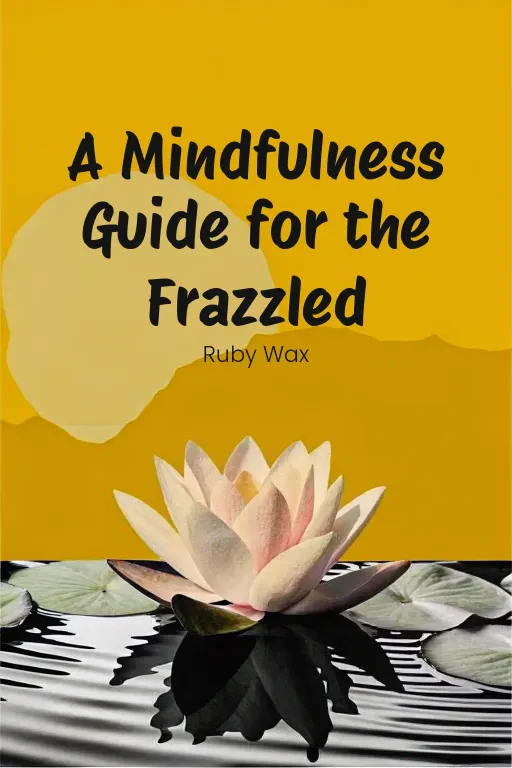
Stress-Proof Your Life: Simple Steps to Calm
Podcast by Beta You with Alex and Michelle
How To Control What You Can and Accept What You Can’t So You Can Stop Freaking Out And Get On With Your Life
Stress-Proof Your Life: Simple Steps to Calm
Part 1
Alex: Hey everyone, welcome back! So, did you ever stop to think about how many hours “each week” we spend just... worrying? You know—those "what if" scenarios, spiraling thoughts… It’s like stress just creeps in and takes over. Michelle: Totally. And honestly, does all that worrying “actually” solve anything? It feels like we're just stuck on this anxiety treadmill – exhausting, loud, and ultimately, pointless. Alex: Exactly! That's where Sarah Knight’s Calm the Fuck Down comes to the rescue. This book is seriously a lifesaver. It's part self-help guide, part… well, a life raft for anyone feeling overwhelmed. With her humor and really sharp insights, Knight gives you the tools to handle whatever life throws at you - from minor annoyances to major disasters. Michelle: And don't let the title throw you off, okay? This isn't about pretending stress doesn't exist. Knight's methods are based on solid techniques, like her "NoWorries Method." That helps you separate those irrational fears from things you actually need to address. It's about dealing with chaos, not running away from it. Alex: Which is why we’re doing this podcast! We’re going to unpack all of this by looking at three main things. First, we’ll talk about why our emotions go into overdrive when we're stressed. Second, we’ll share Knight's smart strategies for regaining control – because your mental energy is way too precious to waste. Michelle: And third, we’re going to talk about building an “emotional fortress," right? Developing habits that make you super resilient when life throws curveballs. Less panic, more… power moves, as you said. Alex: Absolutely. I mean, stress might be unavoidable, but being consumed by it isn’t. So, let’s get into the wisdom – and the humor – of Calm the Fuck Down. Michelle: Emotional rollercoasters, practical tools, and a fortress of calm? Sounds like a good plan. Let’s dive in.
Understanding Anxiety and Emotional Responses
Part 2
Alex: Exactly, Michelle. To start, understanding anxiety and its emotional crew is key. Stress isn't a solo act; it's the ringleader, as Knight puts it, of the “Four Faces of Freaking Out”: anxiety, sadness, anger, and avoidance. These aren't just random feelings popping up; they're all connected, each one amplifying the others. If anxiety's the frontman, the rest are backup singers in a chaotic performance. Michelle: Okay, so anxiety's the lead singer. Got it. But why are we wired to freak out like this? Is that evolution playing a trick on us, or is it just bad decisions disguised? Alex: A bit of both, “really”. Anxiety is rooted in survival—it's our body's alert system. Back in caveman times, spotting dangers like saber-toothed tigers was crucial. Now, instead of predators, we're wrestling with, like, existential dread over deadlines or accidentally booking a flight to the wrong city. Michelle: So our brains think a missed flight is as life-threatening as a giant cat? Evolution could use an upgrade, don't you think? Alex: Precisely, although there's more to it. Knight explains that when stress hits, our emotions split because each serves a purpose. Anxiety pulls us into action—though that “call” is often too loud. Sadness pushes us to reflect. Anger is the fight part of our fight-or-flight, and avoidance? Well, it tries to shield us from discomfort, usually in the wrong ways. Michelle: Speaking of avoidance—our metaphorical ostrich burying its head—it's such a human thing. If you can’t see the problem, it might vanish, yeah? Alex: Exactly. Knight calls it “Ostrich Mode,” and it feels deceivingly comforting. Jury duty summons shoved under a pile of mail, for example. You think ignoring it buys peace, but it just creates bigger issues. Fines, deadlines, panic—hello! Michelle: And then Ostrich Mode morphs into Flamingo Panic. Flailing in bright colors for everyone to see. Alex: Right! Avoidance might soothe you momentarily, but it's a bad band-aid. It doesn’t heal anything; it just prolongs the problem. Knight advises recognizing when you're retreating. Start small, like opening the mail. Little steps break the illusion that things are insurmountable. Michelle: So, Ostrich Mode isn't just procrastination; it's driven by fear. Which brings me to this “everything-is-a-tarantula” idea. That feels, well... creepily spot-on. Alex: Oh, it's extremely relatable. Knight uses the example of turning small stressors into huge fears, like thinking a harmless spider is lethal. Public speaking: you're prepping a keynote, and small worries become huge—“What if the mic dies?” or “What if I forget the intro?” Michelle: Or imagine the absurd worst case: the audience turns into torch-bearing villagers and chases you out. Alex: Right! So Knight suggests naming and facing those fears. Ask, “How likely is this to happen?” Even better, exaggerate the fear to its most ridiculous extent—like your villagers scenario—so it becomes laughable instead of paralyzing. The aim is to remove the threat's power. Michelle: You know, Knight's humor isn't just fun—it’s functional. If you laugh at your tarantula, it shrinks back to being a spider. Like a Jedi mind trick on anxiety. Alex: Humor's a great coping mechanism. And so is self-awareness. Knight emphasizes asking intentional questions, like, “What's really stressing me?” Which brings us to the start: identifying if it's anxiety, sadness, anger, or avoidance at the wheel. Michelle: Ah, the emotional bus. And we've all been terrible drivers at some point. But I like the “Four Faces of Freaking Out." It's like a stress diagnostic—find the root to fix the engine, not just duct-tape the dashboard. Alex: Well put. Knight calls this emotional self-diagnosis key to managing your freakouts. When you know which emotion dominates—and how they connect—you stop reacting blindly and start tackling things thoughtfully. Michelle: And that means knowing how small stressors grow if ignored, like the “Mexican Airport Syndrome” she mentions. Alex: Oh, yes. It shows how manageable stressors—like a delayed flight—can become a landslide. A missed gate becomes lost luggage, then frustration, exhaustion, and finally, a complete meltdown. Michelle: So it's not one “thing” causing it; it's the avalanche. Sounds familiar, doesn't it? Alex: Exactly. Knight’s point is that we must address stress early, before it snowballs. Understanding emotions, even if it sounds basic, lets us act on what we can control instead of drowning in what we can't. Michelle: So, in summary: name the emotion, tame the tarantula, and don't let your stress book its own vacation. Got it.
Techniques for Calming Down
Part 3
Alex: So, by understanding these emotional responses, we can “really” arm ourselves with techniques to manage them . It’s like building on that initial understanding, but now we are providing the "how"—concrete methods to address emotional turmoil . Let’s jump into the first technique: identifying what you can and can't control . Michelle: Ah, the age-old question: "Can I control this?" Sounds simple, doesn't it? But honestly, how often do we actually stop and think about it when we're in the middle of a meltdown? Alex: That’s what's so great about Knight’s approach – it forces us to just pause . When you ask yourself that question, "Can I control this?", you’re able to start filtering out the noise . If it's a yes, you channel your energy where it counts . And if it’s a no, then it might be time to let it go . Simple in theory, profound in practice . Michelle: Okay, but easier said than done, right? I mean, let's take a work deadline . Clock's ticking, the project feels out of control, maybe your manager has unrealistic expectations... and you're already panicking . How does this control question work there? Alex: Exactly! Knight talks about situations like this . You can’t control the deadline, because that's already set . But you can control how you approach the work . She suggests breaking it down into smaller steps, prioritizing the most critical parts, and even communicating with your team for clear expectations . So, the real issue isn’t “really” the deadline, but how you use your energy in that situation . Michelle: Right, so it’s like shifting the focus from the mountain to the path right in front of you . Hmm . But what about that feeling of failure when you realize, "Nope, can't control this"? Doesn't that feel like giving up? Alex: Not at all! Knight's very clear on this – it’s not about giving up, it’s about redirection . When we fixate on what we can't control, we’re wasting time and energy . By accepting it, boom, we’re free to focus on what can influence . Think of it as reclaiming control, not losing it . Michelle: That does sound better than, you know, yelling at the mountain . Still, I bet people hold onto worries, even after letting go of control . Isn't that when irrational fears pop up? Alex: Totally! That’s why the next technique – performing reality checks – is key . When we're stressed, our imagination just goes wild . Knight calls it the "what-if spiral," where worries kinda take on a life of their own . A reality check challenges those fears by asking, "Is this worry actually based on any facts?" Michelle: Okay, give me an example . What does a reality check even look like? Alex: Imagine someone waiting for medical test results . Suddenly their mind is racing with worst-case scenarios, right? "What if it’s… terminal? What if there’s no treatment?" A reality check would be reframing it . Maybe acknowledging, "I don’t have any evidence this is dire . The test is a tool, and until I get the results, worrying won't change anything." Separating what's real from just speculation . Michelle: So, instead of like, catastrophizing, you're playing detective – looking at the evidence instead of quicksand of emotion . But what if the uncertainty is so overwhelming, it's hard to even think logically? Alex: Right, that's when letting go is transformative . Letting go doesn't mean ignoring the problem . It means releasing that unproductive weight of speculation . Shifting mental energy to what can be done, or accepting the unknown until the information comes . Michelle: Which sounds good in theory . But I’m guessing people still struggle with how to prioritize their worries . That's where the "Shitstorm Scale" comes in, right? Alex: Exactly . This is Knight's framework, where you assess the urgency and likelihood of your worries . Each stressor gets organized, from minor stuff to emergencies . Say you send an email with a typo . Your first reaction? "Category 4 disaster!" Because you worry your boss will think you're incompetent . But “really”, that’s more like Category 2 – someone might notice, but it's a trivial thing . Michelle: So, not every typo is the end of the world . Good to know! I do love the humor—it eases the panic, right? Like that alien abduction example Knight uses . If you're ranking that as a "Category 5," you might need a different self-help book . Alex: Exactly . Humor adds perspective . Reminds us that not every worry deserves your energy . Categorizing it like this helps focus on what truly matters while letting go of what doesn't . Michelle: Let me guess – the same principle applies during bigger crises, right? Like, if your stress isn't aliens, if you lost luggage at the airport, you'd still need to triage what's urgent and what can wait? Alex: You got it . Knight calls this emotional triage . Let’s use your example: lost luggage . Panic sets in – no clothes, no toothbrush, maybe no materials for a critical meeting . Triage means stopping the spiral and breaking it up into manageable parts . What requires immediate attention? Buying a new outfit? Contacting the airline? What can wait, like filing a claim later? This calms the chaos . Michelle: So even with something as stressful as lost luggage, you're sort of stabilizing instead of drowning, right? Makes sense . And it all keeps coming down to this: focus on actions, don’t spiral . Alex: Exactly . Each of Knight’s techniques—asking "Can I control this?”, doing reality checks, the Shitstorm Scale, and triaging—equips you to handle stress intentionally . They aren’t about erasing the stress, but managing it in practical, effective ways . Michelle: Practical, but also empowering . It’s almost like building a mental toolkit, one step at a time . Control what you can, laugh at what’s absurd, prioritize what matters, and focus on the now . Seems like a good plan .
Building Long-Term Resilience
Part 4
Alex: So, with those stress-management techniques under our belts, let's talk about applying them when life just keeps throwing curveballs. I mean, it's one thing to handle stress in the moment, but what about building long-term resilience, you know, for the long haul? Thinking about personal growth over the long term, how to really thrive when things get chaotic. Michelle: Exactly, because let’s be honest, stress isn’t exactly a rare occurrence. It’s usually one thing after another, right? So, what is it that lets some people roll with the punches without completely falling apart, while others just crumble under the pressure? What's the secret? Alex: Well, that’s where resilience comes in. Building that emotional strength, seeing failures as growth opportunities, and actively getting ready for those unpredictable moments. Sarah Knight actually breaks it down into three key ideas: embracing imperfection, practicing flexibility, and proactively preparing for when life inevitably throws you a curveball. Michelle: Okay, let’s start with that first one, embracing imperfection. That sounds like it really fits with Knight’s whole philosophy of letting go of the need to control everything. Alex: Absolutely. Embracing imperfection is really the foundation of building resilience. Knight even uses her own fear of flying as a great example. She talks about how, even when she does all the prep work for a trip – checks her bags, picks her seat, confirms all the flight details – there are going to be things she just can't control, like turbulence. And she argues that trying to live this completely predictable, "risk-free" life actually makes anxiety worse and keeps you from enjoying new things. Michelle: Right, because you end up spending all your energy trying to prevent every possible little problem that you end up missing out on actually living, so to speak. Alex: Exactly! Knight’s point is that perfectionism is a trap. It only gives you the illusion of control, and it doesn't actually help you deal with life’s challenges. Instead, she suggests looking at stressful moments as opportunities to grow. For her, that meant developing tools to cope, like deep breathing, or even just finding ways to laugh at how ridiculous her fears were – that helped her manage the anxiety. Michelle: And I guess part of that is also just accepting that things aren't always going to go perfectly, right? Alex: Absolutely. Knight really emphasizes acknowledging that vulnerability – letting yourself feel those uncomfortable feelings without judging yourself for having them. Treating imperfection as a normal part of life, instead of seeing it as some sort of personal failure, that really sets the stage for building emotional resilience in the long run. Michelle: Okay, that makes sense as a general mindset, but here’s the thing: what about people who use "embracing imperfection" as an excuse to just lower their standards? Where’s the line between resilience and just being complacent? Alex: That’s a really good point. But Knight does make an important distinction here. Embracing imperfection isn't about giving up, or not even trying; it’s about adjusting your expectations to be realistic. You're not "settling," you're making a choice to put your energy into what really matters, instead of getting hung up on every little flaw. It’s this active, productive kind of acceptance, rather than just being passive about it. Michelle: So, it’s not about just throwing your hands up and saying, "Oh well, it's out of my hands." It's more like, "Okay, what can I learn from this situation, even if it isn’t perfect?" Alex: Exactly. It’s a shift in how you think that makes room for growth, instead of just frustration. Michelle: Okay, so once you've accepted that things will be imperfect, the next step is to practice flexibility. I love the example of Gladys the cat that Knight uses here. Alex: Isn't that such a great example? So, for anyone who hasn’t heard it, Gladys is Knight’s cat, and she’s really good at handling sudden chaos, like when unexpected guests show up on her porch. She doesn't waste any energy trying to control what she can’t control. Instead, she just steps back, lets things play out, and then goes back to her space once everything has calmed down. Michelle: So Gladys is basically a Zen master disguised as a cat. That's really flexibility in a nutshell – knowing when to act and when to just let things be. Alex: Exactly! Flexibility is about adjusting to what's happening, rather than clinging to these rigid plans you've made. Knight suggests seeing these disruptions as opportunities, instead of obstacles. So, like, if a storm ruins your plans, instead of getting upset, use that unexpected free time to do something productive or meaningful, like reading, or working on a project you’ve been putting off. Michelle: That makes sense. But Alex, let's be real – what about that initial frustration or disappointment? How do you actually get yourself to shift your mindset that quickly? Alex: That’s a really great question. Flexibility doesn’t mean skipping over your emotions. Knight recognizes that you need to feel those feelings first. But the key is, instead of letting those feelings control you, you redirect that energy into problem-solving. She talks about developing this "What's Next?" mentality – asking yourself, "Okay, so what can I do now?" – and that helps you spend less time stuck in that initial disappointment. Michelle: So, the next time someone cuts you off and steals your cab in the rain, instead of just getting furious and soaking your shoes, you think, "Okay, what now? Bus, subway, umbrella?" Alex: Exactly! And as soon as you start focusing on what you can do, you start to feel like you're back in control, even in a situation that felt completely out of your hands at first. Michelle: Speaking of control – or, sometimes, the lack of it – isn't the third pillar of resilience all about getting prepared for those moments of unpredictability? Alex: It is. Resilience isn’t just about reacting well when things go wrong; it’s about actively preparing yourself to handle chaos when it inevitably happens. Knight calls this preparation her version of “emotional dry runs.” Michelle: Emotional dry runs? So, like a fire drill, but for your feelings? Alex: Exactly. It’s about picturing potential stressors ahead of time, so that they don’t hit you so hard when they happen. For example, if you know that travel stresses you out – delayed flights, lost luggage – thinking about those situations in advance lets you come up with solutions, like packing essential stuff in your carry-on. That way, you’re not caught off guard when it actually happens. Michelle: Makes sense, and it sounds logical. But, and I know this might sound cynical, doesn't that take some of the joy out of life? Constantly running through worst-case scenarios sounds exhausting. Alex: That's a fair point, but emotional dry runs aren't about focusing on just the negative possibilities. Knight's approach is a lot more balanced than that. It's about getting ready for what's realistic, not trying to imagine every possible catastrophe. By packing that carry-on or having a backup plan, you're actually creating peace of mind, not anxiety, because you've given yourself the tools to handle the unexpected. Michelle: And these tools include what she calls "Freakout Funds," right? Alex: Exactly! Freakout Funds are your reserve resources – time, energy, money, even goodwill – that act as a buffer. For instance, building downtime into your regular routine helps you maintain your emotional energy. Or, having strong relationships means you have a support system to lean on when times are tough. Michelle: I like that idea – it reframes preparation as something empowering, not paranoid. It’s like backing up your mental hard drive. Alex: Perfect analogy. By decluttering your physical and emotional world through these proactive steps, you're able to respond to crises calmly, instead of feeling totally overwhelmed. Michelle: So, when life throws chaos your way, instead of panicking, you’ve already got a mental and emotional plan in place. Sounds like Knight’s approach is really about creating self-sufficiency – being resourceful, even when things don’t go as planned. Alex: Exactly. Resilience isn’t this magic fix; it’s a bunch of small, ongoing habits that strengthen your ability to face challenges with clarity, grace, and even, you know, a bit of humor.
Conclusion
Part 5
Alex: Wow, what a ride! Today, we “really” dove deep, didn't we? We talked about how stress shows up through those “Four Faces of Freaking Out,” learned some hands-on techniques like asking, "Can I actually control this?" and running reality checks. And, of course, figuring out how to sort and deal with our worries using something like the Shitstorm Scale. Michelle: Right, and it wasn’t just about quick fixes, was it? We also got into building resilience for the long haul—embracing imperfection, staying flexible, and getting ready for those curveballs life throws our way. So, I guess the big lesson here is that stuff's gonna happen, it's inevitable, but how we react, that's what “really” counts. Alex: Exactly! So, here’s a thought I want to leave everyone with: when you feel that stress and uncertainty creeping in, try just pausing and asking yourself, "Am I holding onto something I can’t control, or am I investing in something I actually can?" That pause, that little bit of intentional thought, can totally change how you handle a crisis. Michelle: And hey, let's not forget to laugh a little, right? Whether we’re talking about taming tarantulas or finding our inner Gladys the cat, Knight's approach reminds us that a good laugh can make even the scariest worries seem a bit smaller. Alex: Absolutely. So, take a breath, and remember this: resilience isn't about getting rid of all the stress. No way. It’s about facing it head-on, with a purpose and some perspective. Thanks for hanging out with us today. And until next time, let's keep building up that emotional fortress, brick by brick. Michelle: And don't forget to save up those, uh, Freakout Emergency Funds, people! We'll catch you next time!









